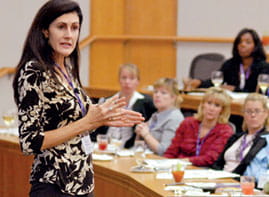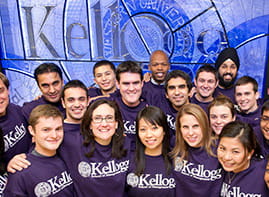Professor Adam Galinsky finds that power breeds cynicism about others’ intentions
2/22/2012 - Why is it so hard for celebrities to form close relationships? How does income disparity strain a marriage? Why is your boss so afraid to trust you?
Adam Galinsky, Kellogg's Morris and Alice Kaplan Professor of Ethics and Decision in Management, recently co-authored a study that explains how imbalances of power can sabotage all kinds of personal relationships.
The study, “How power corrupts relationships: Cynical attributions for others’ generous acts,” will appear in a forthcoming issue of the
Journal of Experimental Social Psychology.
You’ve written a lot about how feeling powerful changes people’s behavior. How does this most recent paper expand on the ideas you’ve already covered?
Adam Galinsky: The thing we’ve continually found is that people who have power seem to be more egocentrically focused on their own needs and they tend to look at other people through an instrumental lens: “How can they help me?” This paper suggests powerful people see others through such an instrumental lens that they also ask the question “What do they want from me? How are they trying to use me to help themselves?”
Are you familiar with your colleague Ithai Stern’s research on flattery and conformity in corporate culture? His work shows that people get power by flattering their bosses, and flattery leads bosses to make bad decisions. Why would anyone want to participate in this vicious cycle?
AG: Yes, some of the attributes that you need to get power tend to disappear once you have power. So to get power, you have to be a pretty good perspective-taker — you have to figure out what’s going to make your boss feel flattered — and then once we get into power, we tend not to do a very good job of taking other people’s ideas, perspectives and thoughts into account.
People often want power because they think it’ll bring them love and affection, but when they get power, it gives them a reason to doubt the purity of that affection. We want to get the Oscar, we want to get the Academy Award because it’s going to put us at the pinnacle of our career, but once we do and people approach me, are they approaching me because they like me, they think I’m talented, or only because they want to get attached to my celebrity and my newfound status?
Your paper looks at how power can reduce trust and make people more cynical in a variety of relationships — professional, romantic, celebrity/non-celebrity, etc. Why are close relationships harder for powerful people?
AG: Almost all the research I’ve done up to this point suggests that power corrupts the way that we treat other people. And this study says it doesn’t just corrupt the way we treat other people, it corrupts the way that we feel we are treated by other people.
True intimacy is hard for the powerful because they don’t take the other person’s perspective. True intimacy is hard because they treat others in an instrumental way. But even when you overcome those barriers and people do treat you in a genuine way in reality, you’re still left with doubting the purity of their behavior.
This research gives most of us a glimpse of how powerful people see us. What can celebrities and other powerful people learn from your research? How can they become better at building and maintaining good relationships?
AG: The powerful tend to close in on their pre-existing relationships. That’s why you see people like LeBron James getting advised by his high school friends.
For the powerful, I think the thing to do is ask yourself the important question, “Are these people being genuine, or am I being cynical?” Once you recognize that your power can be a cause of cynicism, at least it gives you the opportunity to think more carefully — “Was this a genuine act?” “Am I being cynical?” — in a way that I think is really helpful.






